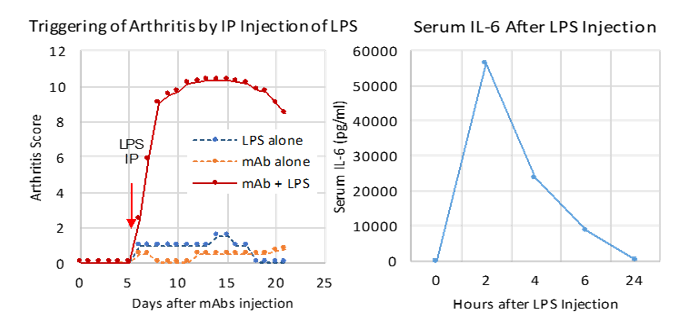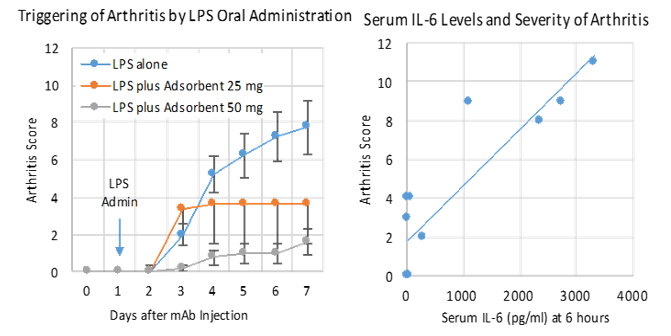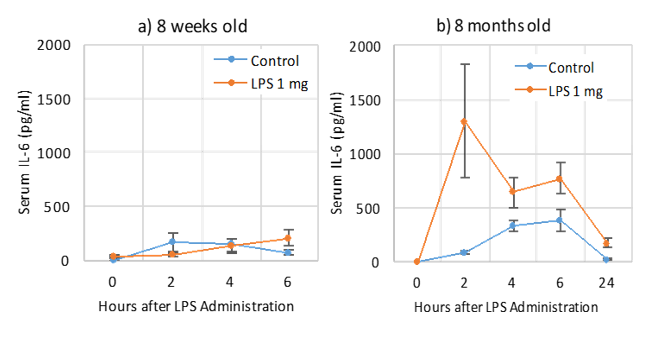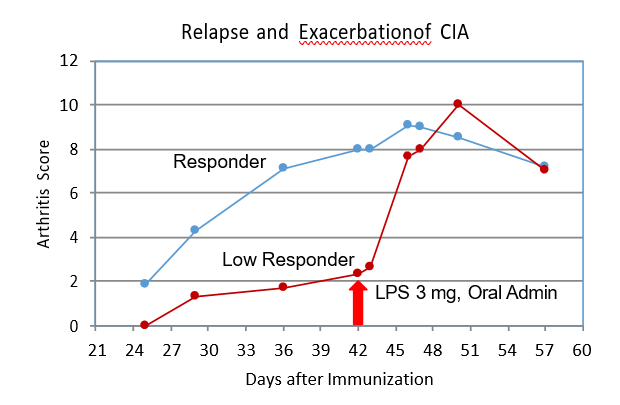Antigens for CAIA, CIA & OCIA Studies
Tools to Study the Role of Bacterial Agents in Rheumatoid Arthritis
1. Collagen Antibody-Induced Arthritis (CAIA)
CAIA is the fastest, most consistent arthritis model to study the pathogenic roles of bacterial agents involved in RA and other autoimmune diseases. Arthritis is induced in mice within 24 - 48 hours by a single injection of a sub-arthritogenic dose of Arthrogen- CIA® monoclonal antibody cocktail followed by (a) IP injection or (b) oral administration of bacterial toxins such as LPS, MAM, or SEB. Interestingly, oral administration of LPS triggers arthritis in old mice (8 months old) but not in young mice (8 weeks old), indicating significant age-associated changes in the mucosal barrier function as seen in Figure (c).
a) Arthritis Triggered by IP Injection of LPS (1)

Procedure
Day 0: IV injection of Arthrogen-CIA® monoclonal antibody cocktail.
Day 5: IP injection of LPS (50 µg) or test samples.
NOTE: LPS can be injected up to 5 days after mAb injection. Serum cytokine level is a marker for the pathogenic effect of test samples.
b) Arthritis Triggered by Oral Administration of LPS (2)

Procedure
Day 0: IV injection of Arthrogen-CIA® monoclonal antibody cocktail.
Day 1: Oral administration of LPS (1 - 3 mg/mouse) with and without an LPS-adsorbent.
NOTE: Severity of arthritis (day 7) correlates with serum IL-6 levels 6 hours after LPS oral administration.
c) Susceptibility to Intestinal LPS Associated with Aging

Comparing Age
Young mice (8 weeks old) are resistant to LPS administered orally, whereas old mice (8 months old) absorb LPS, consequently resulting in an increase in serum IL-6 levels.
NOTE: Anesthetization with Isoflurane increases serum IL-6, indicating a possible effect on mucosal barrier function.
2. Collagen-Induced Arthritis (CIA) (3)
CIA is a flexible model that is ideal to study the long term effects of a plethora of intestinal bacteria and their toxins in RA development. Sub-arthritogenic immunization of type II collagen (CII) is followed by oral administration of LPS, leading to arthritis in low responding mice.

Procedure
Day 0: Immunization with CII/CFA
(MT: 1 mg/ml: Sub-optimal condition).
Day 42: Oral administration of LPS (1 - 3 mg) or test samples in low responding mice.
Day 43: Observe the exacerbation and perpetuation of arthritis.
3. Oral Collagen-Induced Arthritis (OCIA) and Others (4)
This arthritis model is useful in studying the long term effects of bacterial agents, such as intestinal microbes, in conjunction with the host’s immune function. Long term oral administration of a mimic antigen (heterologous type II collagen: CII) and a bacterial toxin (LPS) induces mild, but chronic arthritis.

